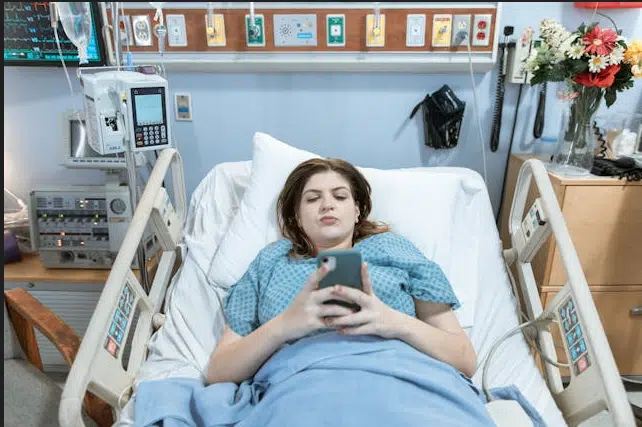How to Improve a Hospital Stay
Posted in Senior Health Care Tips
Spending one or more nights in a hospital bed following treatment is a bucket list item most of us would rather leave unchecked, but the reality is that remaining under supervision following a surgery or other procedure can be a necessary part of the recovery process. 
Arriving at the hospital with the clothes on your back and an ID may be enough to get you through the experience, but you can make the recovery process much less uncomfortable with a little planning and preparation. Read on to learn how.
- Appoint a contact person. It’s nice to receive well-wishes from friends and family, but answering the same questions over and over and being pinged for updates can make you feel like your own publicity manager when you should be focused on getting better.
Consider appointing a trusted friend or family member who you can update as needed and can in turn update your social circle via group chat or other means.
If you want visitors, try to set specific times when you think you will be most comfortable and you are not scheduled for any follow-up treatment to ensure you can enjoy the company uninterrupted.
- The IV/Bathroom Trick. If you have the opportunity, don’t hesitate to specify which arm you would like to have an IV inserted into. Typically, you will want this in the arm closest to the bathroom in your hospital room. Doing so allows you to get up and visit the restroom without needing to navigate your IV pole around the perimeter of your bed. Additionally, ask to keep your IV pole on the same side to avoid tangling in the tube and save you from sleeping with the tube crossed over your body.
- Label your stuff. Be sure that whatever you bring with you for your stay is marked with your name and phone number. While theft is quite rare in a hospital setting, things can get lost very easily. To wit, try to only pack items you can live without should they get lost in the mix.
- Pack personal clothing. Chances are you will not need to remain in a hospital gown for the entirety of your stay, so be sure to pack ample underwear and socks, as well as loose-fitting, comfortable clothes like pajama bottoms or sweatshirts. Having your own clothing can make you more like yourself and provide a surprising amount of comfort during a longer hospital stay.
Also, remember that you may not have control of the hospital room’s temperature, so packing a hat, robe, slippers, or throw blanket can help you stay comfortable if the room gets chilly.
Finally, don’t forget to pack fresh clothes for your return home.
- Bedding and sleep aides. It’s best to ask ahead, but most hospitals will allow patients to bring along their own blanket and pillow, which can make catching up on sleep much more comfortable. Some patients even report success in bringing along foam egg crate-style mattress toppers.
Finally, keep in mind that between people coming and going from your room, the beeps of medical equipment, and changing light conditions, you may not be able to create the perfect sleep environment. Consider packing ear plugs and an eye mask if you are particular about your sleep conditions.
- Gadgets and entertainment. Be sure to pack items to keep you entertained. Hobby kits, laptops, books, or even portable gaming systems can all help pass time while you recover. If you are bringing along electronics, you may want to bring a short extension cord and you will definitely want a long cable for your phone charger, as the nearest plug may be far from your bed.While not necessarily a form of entertainment, be sure to also pack a notepad and a few pens in your hospital bag. Keep track of what your doctors and nurses tell you, and make note of scheduled events like physical therapy and meal times.
- Snacks. Check on your hospital’s outside food and refrigeration policy, and try to learn if there will be any dietary restrictions you need to follow after your procedure. Based on what you hear, pack along some of your favorite snacks (labeled with your name) as a way to stay cheered up and celebrate your recovery progress.
Also consider packing any condiments you enjoy. While hospital kitchens work hard to produce nice meals for patients, everything goes better with a taste of home.
- Toiletries. Hospitals tend to provide their own toiletries for patients much like a hotel, but chances are you may prefer your own hygienic products like toothpaste, soap, and moisturizer.
Table space and storage can be limited in a hospital room, so packing your toiletries in a small travel bag or plastic bin can help keep your area organized during your stay.
Our team of home health care experts has extensive experience helping New Yorkers return home from hospital stays and providing in-home assistance during the recovery process.
Home health care allows patients to maintain their independence in familiar surroundings while providing personalized medical care and assistance.
To learn more about SelectCare and how we help, call today, request a free in-home care guide, or read our client testimonials.
